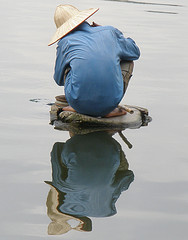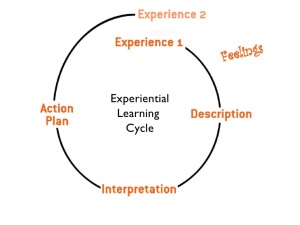#ELTchat summary – Reflective Practice
6May 31, 2015 by gemmalunn
This is the summary for the 6th May #ELTchat where we discussed the how, why, when and where’s of reflective practice.
We started the chat by defining: What is a reflective practitioner?
– Someone who takes time to think about how their lessons went, what went well, what could be improved etc (@juliacphang)
– Reflective teachers are seldom satisfied with what they do (@GlenysHanson)
– Someone who enjoys reaching out in order to improve (@rmoyano5) as in inviting collaboration and reflection (@Marissa_C)
– Awareness is a big part of being a reflective practitioner, working out why things happened / are happening in the classroom (@GemL1) and not just blaming the students (@KateLloyd05)
– Reflection involves the metacognitive aspects as if you stand out of yourself to comment on your practice (@Nafooh1988)
– Being able to ask the right questions after the lesson? When something goes wrong, we usually sulk about it but the question is what do we learn from the failure (@HanaTicha) but also during the lesson too as reflection also takes place while teaching (@rmoyano5) and possibly before (@harrisonmike)
We then moved on to discuss: Can we train teachers to be reflective?
– I think reflection can be encouraged but it’s hard to teach as such. Providing tools and space to reflect helps a lot (@juliacphang) and stalling giving them feedback – let them evaluate self first (Marisa_C)
– Sometimes I think that being reflective is part of human nature but I believe it can be trained (@HanaTicha)
– By providing debates for example. Discussions in which issues are talked about and even analyzed (@rmoyano5)
– It can definitely be built into training. An opportunity to reflect after every lesson (@theteacherjames)
– Tools such as the ELC (Experiential Learning Cycle) can help (@GemL1)
We then discussed: How can teachers become better reflective practitioners?
Observe and be observed
– Go and see other people’s lessons; this helps me enormously. I relate every aspect of the observed lesson to my own teaching (@HanaTicha)
– I learned loads about teaching well from observing others, not things I wasn’t doing, but watching s/o else makes u think why? @KateLloyd05
– @Joannacre asked – How do we decide on what to look at when we observe others? Is it based on what we are not good at?
– If they have not asked u to look at specific aspects then look for things u are good at or not good at – it varies. Or use a reduced checklist of criteria – may be following what you were given or checklists u were given on the delta (@Marisa_C)
– I’ve found it useful to have observers who see what I don’t in my class (@GlenysHanson)
Self-observation
Either videoing a class or even just audio if you don’t have opportunity to set up a camera. Smartphone in pocket will do @harrisonmike just make sure you have consent from your school and students before doing this!
– One area that works really well for reflection is analysing your own talk: what categories of talk do you use? Mainly Management? Instructional or Eliciting talk? % important (@Marisa_C)
– @Marisa_C Watching the learners a great idea @HanaTicha wrote this great blog post about videotaping her Ss [see below for link]
– Reflection should be focused – Ts don’t have enough time to watch themselves all the time so we need Qs for reflection- a goal (@Marisa_C) therefore it’s as good idea to focus on specific areas where you want to improve (@theteacherjames)
– I found videoing classes v.useful 4 more accurate RP things r not always as they seem/u remember, or just record snippets of class and focus on different aspects – CCQs, starting a class etc (@GemL1)
What kind of feedback do we need, in order to know if we are getting better?
– Sandwich feedback works fine (positive-negative-positive) (@HanaTicha)
– We definitely need support to deal with criticism in all its forms and use it constructively (@ITLegge)
– Feedback from students, other teachers and when possible watching ourselves (recordings) (@joannacre)
– Self feedback – notes in reflective journal – feedback from others – informal observations are great. Also, getting a record down is essential then, even if only the high/lowlights – 5 bullet pts per lesson at least (@harrisonmike)
– Getting students to write in journals is a way to get feedback as well (@joannacre)
How and where can we reflect?
Social media and blogging
– Social media like twitter and facebook groups are a great way for teachers to connect and reflect (@Marisa_C)
– Twitter has made huge impact on my work and prof choices: learn something new every day (@ITLegge)
– So encouraging blogging is a good way of soliciting reflection? (@Marisa_C)
I definitely think so! You sit down and write – CPD/reflection with yourself (@joannacre)
– Blogging, writing things down, asking a colleague for opinion seeing things through a different perspective; that all helps (@HanaTicha)
– I think so-my blog is v.new but hope to use to reflect, esp as self-employed so Twitter=virtual staffroom! (@juliacphang)
RP Groups
– RP groups are a great way to encourage / learn about RP and help people explore their teaching more (@GemL1). These could be face-to-face or also online (@Marisa_C), also beneficial to have Teachers from different schools to offer different perspectives (the RP groups in Korea are a great example) (@GemL1).
We then touched on the importance of distance and being objective whilst reflecting
– I’ve found it useful to name my emotions to get distance from them so I can concentrate on the pedagogical reflection. Also not to think about my actions in class as “good” and “bad” – because they block me – but in more neutral terms (@GlenysHanson). Helpful to reflect in 3rd person for distance from problems and be more objective (@MarjorieRosenbe; @GemL1) – @JFanselow does a lot of good work on this aspect (@GemL1)
– Time heals all wounds. It’s good to wait a few days after a disastrous lesson and things become clear, even without reflection @HanaTicha
– Sometimes distancing yourself from the battlefield and bringing in another discipline helps a LOT (@Marisa_C)
Finally….do we always need to reflect?
– Do we need to reflect all the time? I’m not so sure. Constant analysis can possibly give feelings of burnout (@harrisonmike) but I guess we always reflect in some way after a class
(@Shaunwilden) but this doesn’t always have to be in an organised way at all (@SueAnnan)
– That’s why the 3-5 bullet point list as you go is probably best review at the end of the day (@harrisonmike)
– You have to get the balance between self-examination and resting on your laurels (@theteacherjames)
– It doesn’t need 2 always b in depth reflection could just b a few moments in class to be aware (@GemL1)
Finally I’ll finish with this apt tweet from @Marisa_C:
We learn better together and reflect better as well
Useful links / Further reading
– @HanaTicha: Observing class in retrospect
– @ZhenyaDnipro has a great blog with tips on reflection
– @JosetteLB also has a great RP blog
– @MarjorieRosenbe: On trying something new
– John Faneslow: Breaking rules book.
– My posts about transcribing and analysing your own talk
– “Classroom Interaction” by Malamah-Thomas OUP book on teacher talk






A very helpful summary, thanks Gemma 🙂 definitely useful as I learn how to be a bit more constructive in my reflections!
No probs, glad it’s useful. It’s great that you are aware of reflecting and blogging etc already! You are a model newbie teacher!
Ooh I don’t know about that! I think I’ve just always had a chronic case of verbal diarrhoea…!!! 🙂 but I do enjoy writing so I suppose that’s the most important thing!
Haha yes definitely and doesn’t come across like verbal diarrhoea!
Thank you very much for the post, and for the mention, Gemma! The RP groups in Korea is a wonderful example of reflecting – and not being burned out by doing so. Learning a lot from you!
You’re welcome Zhenya. Yes the RP groups are great, I really miss them now!